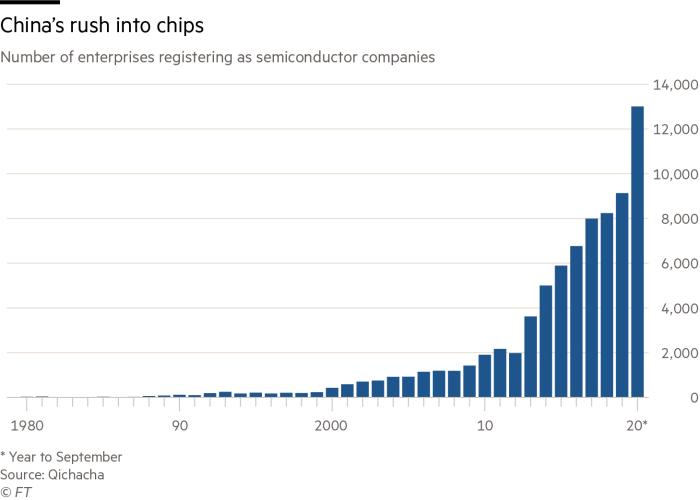Chinese companies are rushing into the country’s semiconductor sector, spurred by a multibillion-dollar government plan to boost the industry to counter growing technological pressure from the US.
More than 13,000 Chinese enterprises registered as semiconductor companies in the first nine months of this year, according to data from Qichacha, a Chinese companies information provider.
The numbers are double the monthly average of last year, with registrations jumping more than 30 per cent in September alone. Many companies entering the industry have no experience in semiconductors, coming from sectors such as auto parts or seafood.
Beijing is expected to sharply increase financial support for the chip industry as part of its 14th Five-Year Plan, to be announced at the end of October, in response to US efforts to block China’s development as a technology power.
Some state media have dubbed this push the “Great Semiconductor Leap Forward”, referring to the 1957 order by Mao Zedong to surpass western industrial nations by producing steel in backyard furnaces — an effort that eventually led to history’s largest famine.
President Xi Jinping has pledged to invest $1.4tn in the six years to 2025 to build high-tech industries from mobile networks to artificial intelligence.

Douglas Fuller, a professor at City University in Hong Kong and an expert on China’s industrial policy in the chip sector, said the wave of new entrants into the industry was being driven by “subsidies, or the hope for even more subsidies”.
“There have always been waves of state activism in this industry but the possibility that companies completely outside this sector are jumping in is a departure from history,” added Prof Fuller.
China imports more than $300bn of semiconductors a year, above any other product including oil. A significant amount of those chips are for China’s export industry.
The latest push is partly in response to US president Donald Trump’s efforts to squeeze China’s technology sector. Washington has imposed sanctions on Huawei, China’s largest technology company, and more recently on Semiconductor Manufacturing International Corporation, the country’s biggest chipmaker.
Public records show that Chinese companies with no known experience of semiconductors are moving into the sector.
Shanghai Xinpeng Industry Co, an auto parts maker, registered as a semiconductor producer in July. Since the end of last year, it has invested more than Rmb400m ($59m) in semiconductor factories in Beijing, Shanghai, Nanjing, Tianjin and Foshan.
Dalian Morningstar Network Technology Co, a seafood maker turned online gaming company, said in May it planned to pay Rmb230m for a 51 per cent stake in a lossmaking Shanghai-based semiconductor group.
DMNT lost Rmb1bn last year but shares of the Shenzhen-listed company have more than doubled since it announced the Shanghai semiconductor investment. “Our gaming business is languishing,” said an official at the company. “Semiconductors have a better future.”
Shanghai Xinpeng did not reply to emailed requests for comment.
While China has spent billions trying to create its own semiconductor industry over the past 40 years, the scale of the latest push — and the rhetoric surrounding it — are unprecedented.
Chinese state media describe developing the semiconductor industry as an “all-nation effort”, phraseology previously reserved for tasks such as the 2008 Beijing Olympics and the fight against coronavirus.
Bai Chunli, president of the Chinese Academy of Sciences, told reporters last month China needed to invest more in advanced semiconductors and equipment for manufacturing integrated circuits to avoid being “strangled” technologically by the US.
While there have been public warnings in China against a blind rush into chips, many downplay the risks.
“Of course, looking at how we now have more than 10,000 projects, definitely a large number will run into problems,” Lu Lei, secretary-general of the Shanghai Information Services Association, an industry group, said in a TV interview last month. “We must not view that as waste. We must look at it as the price you have to pay to develop an industry. It’s a natural process that has to happen, you must have quantity to arrive at quality.”
"chips" - Google News
October 13, 2020 at 06:01AM
https://ift.tt/3jTRBMm
Chinese groups go from fish to chips in new ‘Great Leap Forward’ - Financial Times
"chips" - Google News
https://ift.tt/2RGyUAH
https://ift.tt/3feFffJ
Bagikan Berita Ini















0 Response to "Chinese groups go from fish to chips in new ‘Great Leap Forward’ - Financial Times"
Post a Comment